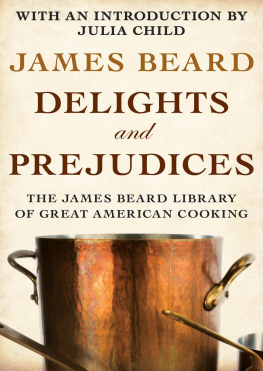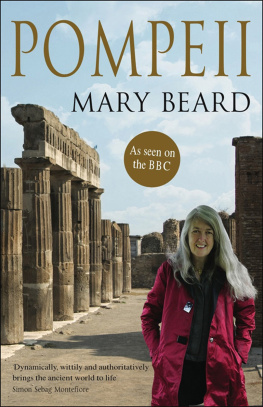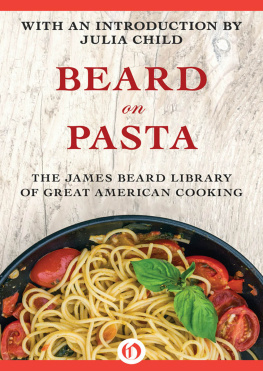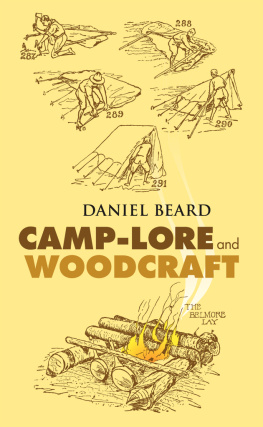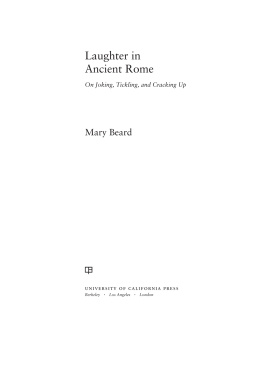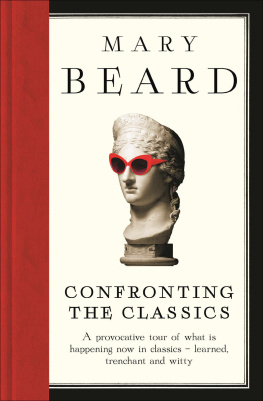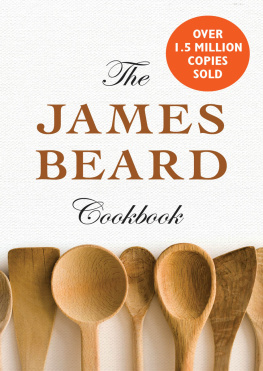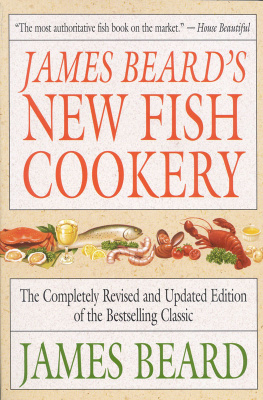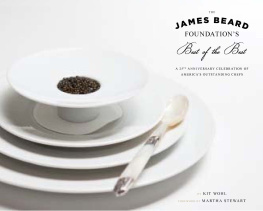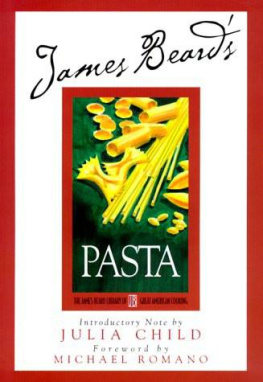Delights and Prejudices
James Beard
Introduction by Julia Child

Contents
Introductory Note
It is wonderful for all of us who treasure James Beard to know that his works are being kept alive for everyone to enjoy. What a pleasure for those of us who knew Jim to read him again, and what a treasure and happy discovery for new generations who will now know him. He reads just as he talked, and to read him is like being with him, with all his warmth, humor, and wisdom.
Beard appeared on the American culinary scene in 1940, with his first book, Hors dOeuvre and Canaps, which is still in print more than fifty years later. Born in Portland, Oregon, at the beginning of the twentieth century, he came from a food-loving background and started his own catering business after moving to New York in 1938. He soon began teaching, lecturing, giving culinary demonstrations, and writing articles and more books (eventually twenty in all). Through the years he gradually became not only the leading culinary figure in the country, but The Dean of American Cuisine. He remains with us as a treasured authority, and the James Beard Foundation, housed in his own home on West 12th Street in New York, keeps his image and his love of good food very much alive.
Beard was the quintessential American cook. Well-educated and well-traveled during his eighty-two years, he was familiar with many cuisines but he remained fundamentally American. He was a big man, over six feet tall, with a big belly, and huge hands. An endearing and always lively teacher, he loved people, loved his work, loved gossip, loved to eat, loved a good time.
I always remember him for his generosity toward others in the profession. For instance, when my French colleague Simone Beck came to New York for the publication of our first book, my husband and I knew no one at all in the food business, since we had been living abroad for fifteen years. Nobody had ever heard of us, but our book fortunately got a most complimentary review from Craig Claiborne in the New York Times. Although we had never met him before, it was Jim who greeted us warmly and introduced us to the New York food scene and its personalities. He wanted friends to meet friends, and he literally knew everyone who was anyone in the business. He was not only generous in bringing them together, but eager that they know one another. It was he who introduced us to the late Joe Baum of the then-famous Restaurant Associates and The Four Seasons, among other famous restaurants. He presented us to Jacques Ppin, at that time a young chef from France who was just making his way in New York, and to Elizabeth David, Englands doyenne of food writers, as well as to many others.
It was not only that he knew everyone, he was also a living encyclopedia of culinary lore and history, and generous about sharing his knowledge. So often when I needed to know something about grains, for instance, I would call him and if the information was not right in his head, he would call back in a few minutes with either the answer or a source. This capability and memory served him well in his books and articles, as well as in conversation and in public interviews.
James A. Beard was an American treasure, and his books remain the American classics that deserve an honored place on the shelves of everyone who loves food.
Julia Child
April 1, 1999
Foreword
I am honored to pen the foreword for this spectacular work of both culinary and literary significance. James Beards life and writing has had a profound influence on my work. I had the good fortune to meet him during his visit to San Francisco in the early 1980s. I remember the moment distinctly and can recall the warm aura of hospitality that surrounded him. During the years leading up to the opening of our restaurant, I spent my time reading and absorbing as much as I could about his philosophy. I still look to him for guidance and inspiration.
Sitting down to write a bit about James Beard and his magnificent Delights and Prejudices, I was startled to realize that he passed away more than fifteen years ago. I glanced across my desk to the bookshelf where his numerous books are prominently placed and well worn. As the innovator of cooking on television, he opened the door for Julia Childs legendary series, Emerils breakaway success, and my own effort on PBS. He was a pioneer in outdoor cooking, writing the first book on a subject that has now been taken up enthusiastically by home cooks in backyards across the country. Chefs relish the opportunity to cook in his kitchen papered with vivid maps where he taught, cooked, and imbibed with the best in the culinary community. The highest honor for chefs, restaurateurs, cookbook authors, and culinary broadcasters is to receive an award with his name. James Beard is still very much a vital influence on the American culinary scene.
Reading Delights and Prejudices, one instantly falls in love with food and James Beard. As though he was across the table enjoying a glass of wine with the reader, he tells the tales of the meals that made him the Father of American Cooking. Delights and Prejudices is the closest he ever comes to writing an autobiography. The early memories are the tastes and the scents that influenced not just the writing of this book, but his later works as well. He not only had an incredible palate and insatiable curiosity, but a sharp, astute wit that peppers his writing. The descriptions of his mothers amazing kitchen and boarding house take you back to his childhood. The chapter on canning cannot be finished without wishing for a mother with the same talents. He brings the reader to the finest restaurants in the Portland, Oregon, of his youth, sharing their secrets and recipes.
Whether categorically rejecting the food of the Caribbean as the worst in the world or waxing nostalgic about the splendors of Les Halles in Paris, he tells it as he sees it. Time has proven him right in almost every case. He records the regional cooking of the Northwest, including the Asian influence that even then was asserting its influence along the Pacific Coast. Before American cuisine became nouvelle or modern and all the rage, Beard championed the fresh, straightforward cuisine that he grew up eating. Perhaps the most indicative of the continued relevance of his recipes is the chapter on Hors Doeuvre, Inc. This catering business spurred the writing of his first book and demonstrated his unwavering taste and ability. When searching for a reliable, delicious recipe one needs to look no further than these pages. Delights and Prejudices ranks with Escoffiers tome as a must for every serious culinarian.
Charlie Trotter
May 16, 2001
CHAPTER
One
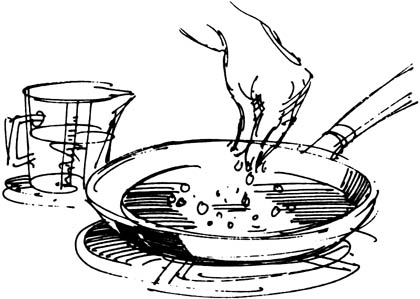
When Proust recollected the precise taste sensation of the little scalloped
Next page
